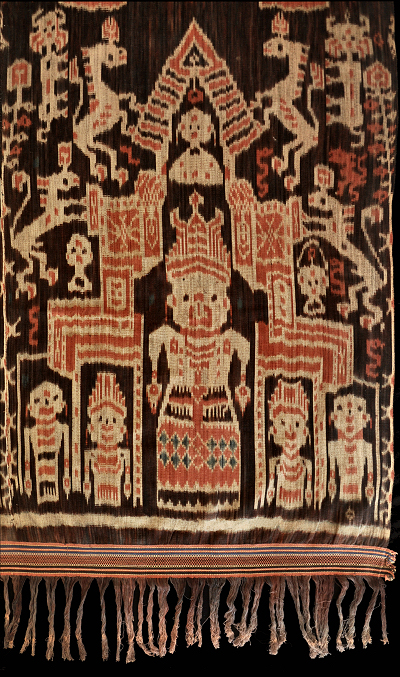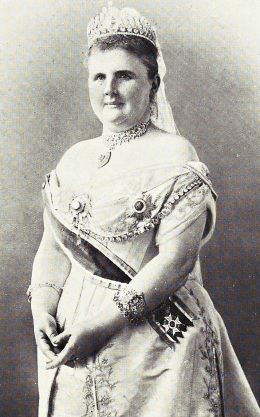| |
 

LEFT THE COLLECTION
display continued to support resarch | | | |
152 Sumba, East Sumba
Hinggi (men's blanket)
| | Locale: | Probably Kanatang | | Period: | Circa 1950 | | Yarn: | Cotton, hand-spun, fine | | Technique: | Warp ikat | | Panels: | 2 | | Size: | 137 x 240 cm (4' 5" x 7' 10") LW: 1.75 | | Weight: | 935 g (33.0 oz), 284 g/m2 (0.93 oz/ft2) | | Design: | Unusual motif, most likely representing the Dutch Queen Emma, who, unlike her daughter Wilhemina does not commonly appear on Sumba hinggi. She is flanked by four lesser figures. The two innermost figures are crowned as well, and may represent the future queen Wilhelmina, her only child; the outer two, who appear male, are not. The queen is depicted as standing within an enclosure, perhaps a temple gate, with a bust floating over her. She is surrounded by six mounting lions. The central band shows five habaka figures, the hallmark of the Kanatang royal family. Remarkably, the two panels were stitched together asymmetrically. Clearly with intent, as the kabakil was woven on after. | | Comment: | [PHOTOGRAPHY PROVISIONAL] Dutch Queen Emma reigned from 1890-1898 as regent for her daughter Wilhelmina. It appears almost certain that this early 20th C. hinggi indeed represents Emma rather than Wilhelmina. The perception of the piece's age places it in or shortly after the reign of Emma, and the monarch is depicted as rather stout, which matches mature Emma's figure, not Wilhelmina's, who, certainly at the time she ascended to the throne, was young and slim, and is depicted as such on some hinggi, such as our PC 073. Emma was a much loved queen, who had a personal interest in the Dutch East Indies. From old Dutch collection. Image shows one quarter of the cloth. Below: Queen Emma two years after her abdication.
 | | Background: | Chapters on Sumba and East Sumba. | | Published: | Carpet Collector 1/2016, | | Compare: | 065 072 073 019 | | Sources: | Very similar to hinggi dated second half of the 20th c. in Khan Majlis, Woven Messages, Fig. 9. | | |

©Peter ten Hoopen, 2025
All rights reserved.
|
|


